Becoming a Professional Discus Breeder
WHY IS DISCUS BREEDING PROFITABLE?
Transform your hobby into a business! Discus breeding is not only fulfilling, but also very profitable. Since many discus are imported, you can earn significant profit by selling locally bred discus, which tend to be healthier than imported ones. When you start breeding successfully, you will establish your reputation, and then you will be able to purchase more tanks and make this a profitable business. In this article, we’ll help you get started!
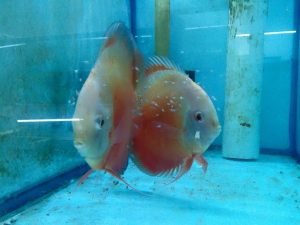
Red Passion Discus Breeding Pair with Young
WHICH DISCUS SHOULD I SELECT FOR BREEDING?
When selecting your discus for breeding, there are a few things you want to keep in mind. First, you want your discus to be round; hence, the name of the fish! Next, look at their fins. You want to see a healthy protrusion of fin from the body, a curvature that has an almost semi-circle shape. Look at the eyes to see if any of them are “chipped.” In other words, a healthy discus should have eyes that look like a complete circle. If you see any eyes that are chipped, they may be genetically compromised and not ideal for inbreeding. Not to worry! This doesn’t mean the fish are ill. It simply means that they are not ideal for producing robust offspring. So if you don’t intend to breed all your discus, you can keep the ones with the chipped eyes.
Creating a discus breeding business requires good breeding pairs. We recommend that you begin with ten young discus, raise them to adulthood, and wait for them to pair off. It’s also important to note that people are generally not interested in buying “mutts,” so you want to be sure that the juvenile discus that you purchase are of the same strain.
WHAT EQUIPMENT SHOULD I USE?
A tank of about fifty-five gallons is ideal for keeping five to seven discus. You’ll need an aqua clear 500 filter and a water heater of 250 watts. A check-valve and airstone or bubble wand is fine for aeration, and a dechlorinator, such as Seachem Prime, should be applied on tap water.
There are some conflicting ideas about what to do with the bottom of the tank. While some owners use standard gravel, others put nothing on the tank’s bottom glass as a way to avoid extra waste buildup. A tank without gravel is highly recommended because discus are fussy creatures who flourish best in pristine water.
HOW SHOULD I CARE FOR MY DISCUS?
The pH level of the water is very important. For the discus, it should be kept at around 6 to 6.5, and should never exceed 7. You can use a conductivity meter to monitor the pH level. The nitrate level should stay under 20 ppm.
These Amazonian fish need to be kept in warm water. Around 82 degrees Fahrenheit is perfect. Many breeders focus on feeding the fish protein to pump up their size. There is a formula that is popular and filled with protein, and it is also optional to supplement their diets with blood worms, spinach or nori (cooked seaweed), and beef heart.
HOW DO I CARE FOR THE EGGS AND FRY?
Once the eggs are laid, it will take about two days for them to hatch. They first feed off of a substance that secretes out of their parents’ bodies. The fry will be sustained by this substance for about two to three weeks, and then they can be fed.
When the young fish are ready to eat solid food, live baby brine shrimp is most commonly used to feed them. Once they begin to eat the shrimp, they can also be fed high-grade, fine fish flake food. The fish should be kept with the parents for about six weeks. Once they start to venture out on their own, they can be separated from the parents.
WHAT CHALLENGES MAY ARISE, AND HOW SHOULD I RESPOND TO THEM?
Within months, newborn discus sometimes develop gill flukes. They affect the fish’s breathing and can create mucus in the gills and turn them a dark color. You must treat this problem right away, or else the babies can start dying very quickly. “Life Bearer” and “Fluke Tabs” are two effective treatments. Also, wiping the inside of the tank down frequently is a good way to combat gill flukes.
Sometimes the tank’s water is too hard. To soften the water, add a mixture of 50% distilled water and 50% spring water.
Another possibility is that the two fish start fighting. If they fight, separate them. You can use a piece of glass or simply put one in another tank.
Following these suggestions, you can have a very profitable discus-breeding business. Soon, you will have a tank full of fish that you bred yourself! Check out the rest of our Learning Center articles under the Breeding section, and you’ll learn more about how to start your discus breeding business. Good luck!
Discus with Young
QUESTIONS
- What do you think are the most important factors to consider when breeding discus?
- What are your goals as a discus breeder?
- What does a successful discus-breeding business mean to you?
- Ideally, how many tanks would you like to have with a discus-breeding business?
- What other Learning Center articles under the Breeding section do you want to check out?
Share this post
Leave a Reply
You must be logged in to post a comment.

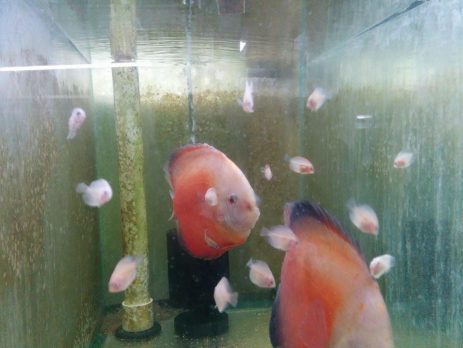
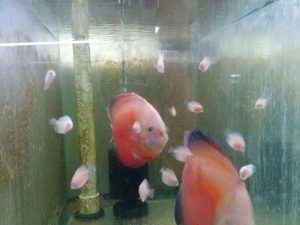
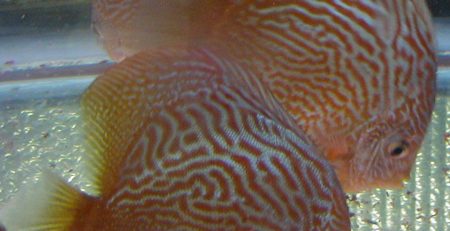
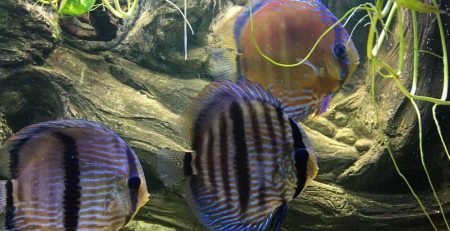
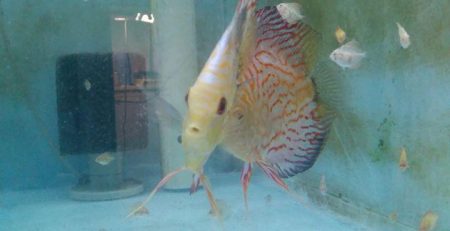
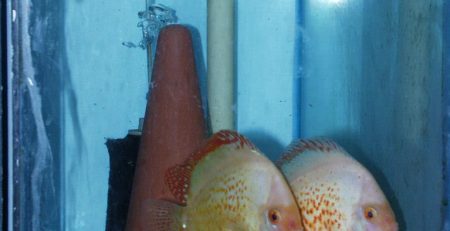
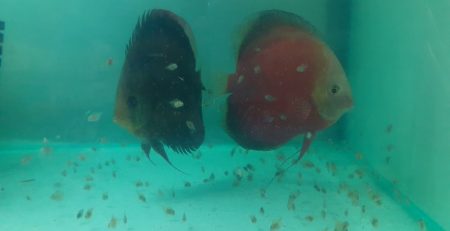
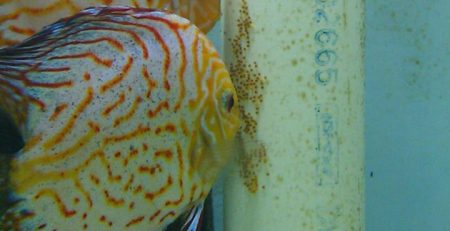
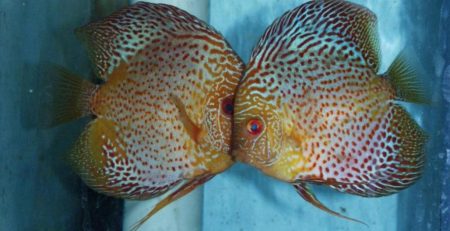
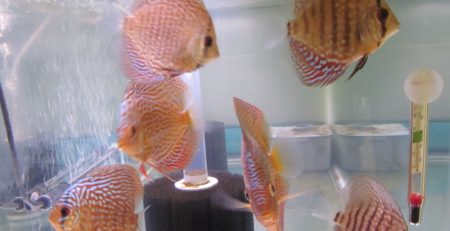
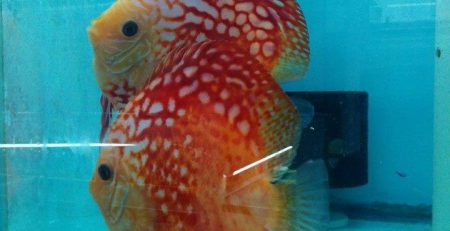
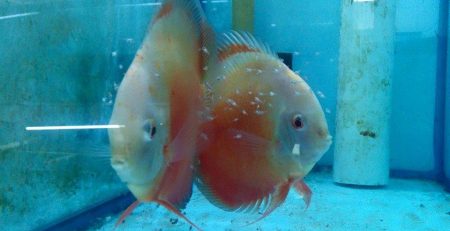
Comment (1)
I have 2 pair of Breeding Discus. They are all in separate breeding Tank (20 Gallon). The female lay eggs almost every week. the male also ejaculates, but within a few weeks, the fertilization fails. Eggs are all white, and I am not successful. Are both male impotent? Sometimes they also eat their eggs. Can you help me ? Thx